The practice of data engineering in digital product engineering, involving data collection, transformation, and organization for analysis, is on the brink of a major revolution thanks to the emergence of Generative Artificial Intelligence (Gen AI). As a subfield of Artificial Intelligence (AI), Gen AI specializes in creating AI systems capable of generating novel knowledge and insights. The potential impact of Gen AI on data engineering is vast, holding the promise of completely transforming how we approach data processing, analysis, and utilization.
This blog will explore various aspects of Gen AI’s influence on data engineering in digital product engineering, encompassing its contributions to improving data quality, automating tasks, streamlining data integration, handling privacy and security issues, and the ethical considerations tied to its implementation. By delving into these areas, we can obtain a holistic comprehension of how Gen AI is reshaping the landscape of data engineering and its profound impact on our data-driven society.
The significance of GenAI
In order to grasp the significance of Gen AI’s future implications in data engineering, let’s examine some compelling statistics:
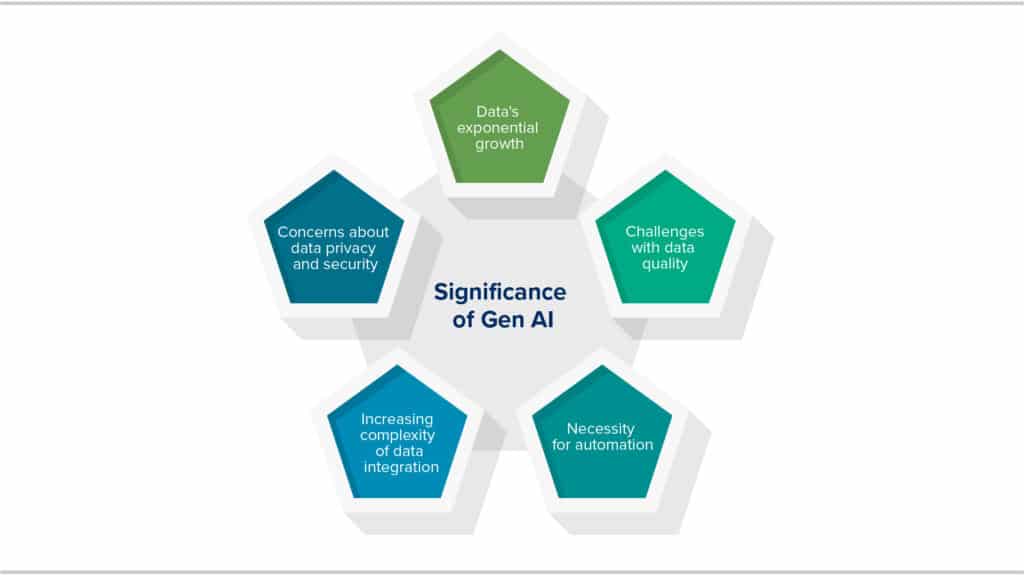
- Data’s exponential growth: Data has been experiencing exponential growth, with IBM reporting that approximately 90% of the world’s data has been generated in just the last two years. This rapid expansion in data volume presents a challenge for conventional data engineering methods. Gen AI, however, holds the potential to address this challenge by automating data processing tasks and extracting valuable insights from the vast amounts of data.
- Challenges with data quality: Data quality continues to be a critical issue in data engineering. According to the Data Warehousing Institute, inadequate data quality results in an estimated annual cost of approximately $600 billion for organizations in the United States. Leveraging Gen AI techniques, such as machine learning algorithms and automated data cleaning processes, can notably improve data quality and accuracy, thereby minimizing errors and inconsistencies in datasets.
- Necessity for automation: Data engineering tasks can consume substantial time and resources. According to Gartner’s prediction, by the end of 2023, over 75% of organizations will adopt AI-based automation for data management tasks. Gen AI has the capacity to automate multiple data engineering processes, such as data integration, transformation, and pipeline creation, enabling data engineers to allocate their time to more valuable endeavors.
- Increasing complexity of data integration: As data sources and formats continue to proliferate, the complexity of data integration has surged. A survey conducted by SnapLogic revealed that 88% of data professionals encounter difficulties when integrating data from various sources. Gen AI can play a pivotal role in streamlining data integration which can help in reducing the time taken by product engineers in the productization process by utilizing intelligent algorithms to identify data relationships, map schemas, and enable smooth integration across diverse datasets.
- Concerns about data privacy and security: As data’s value increases, safeguarding data privacy and security becomes crucial. The World Economic Forum projects that cyber-attacks could lead to $10.5 trillion in global damages annually by 2025. Gen AI brings forth opportunities and challenges in this regard, as it can aid in identifying and mitigating security risks, while also raising concerns about responsible handling of sensitive data and guarding against algorithmic bias.
Exploring the advantages and obstacles of automating data engineering tasks with Gen AI
The transformative impact of automation for product engineering companies is undeniable, and Gen AI holds tremendous potential for automating diverse data engineering tasks. Embracing Gen AI empowers organizations to optimize data engineering processes, enhance efficiency, and unlock novel opportunities. Nonetheless, alongside these benefits, it is essential to acknowledge the challenges that come with implementing Gen AI. Let’s explore:
Advantages of employing Gen AI for automating data engineering tasks
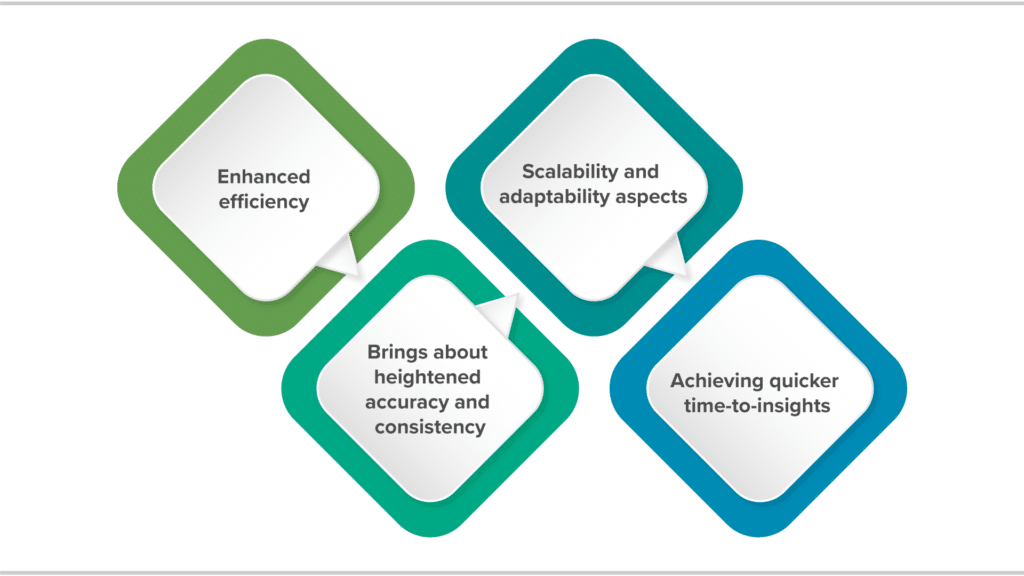
- Enhanced efficiency: By automating laborious and time-consuming data engineering tasks like data extraction, transformation, loading (ETL), data integration, and data pipeline creation, Gen AI streamlines processes leading to reduced manual effort, faster data processing, and improved overall efficiency in managing extensive data volumes for organizations.
- Gen AI brings about heightened accuracy and consistency: Traditional manual data engineering processes are susceptible to human errors, resulting in data inconsistencies and inaccuracies. Leveraging Gen AI techniques, which possess the capability to process data consistently and precisely, enhances data accuracy, reduces errors, and ensures consistency in data engineering pipelines. Consequently, this fosters more reliable and trustworthy data analysis outcomes.
- Scalability and adaptability aspects: Given the exponential growth in data volumes, scalability becomes a crucial factor in data engineering. Gen AI-driven automation empowers organizations to efficiently scale their data engineering processes, be it handling larger datasets, incorporating new data sources, or adapting to evolving business requirements. Gen AI-powered automation offers the much-needed flexibility and scalability to address these challenges effectively.
- Achieving quicker time-to-insights: The integration of Gen AI-driven automation expedites data engineering processes, resulting in faster delivery of insights. By minimizing manual intervention, organizations can optimize data pipelines, alleviate bottlenecks, and expedite the transformation of raw data into actionable insights. This equips decision-makers with timely and pertinent information, empowering them to make data-driven decisions more effectively.
Obstacles involved in automating data engineering tasks with Gen AI
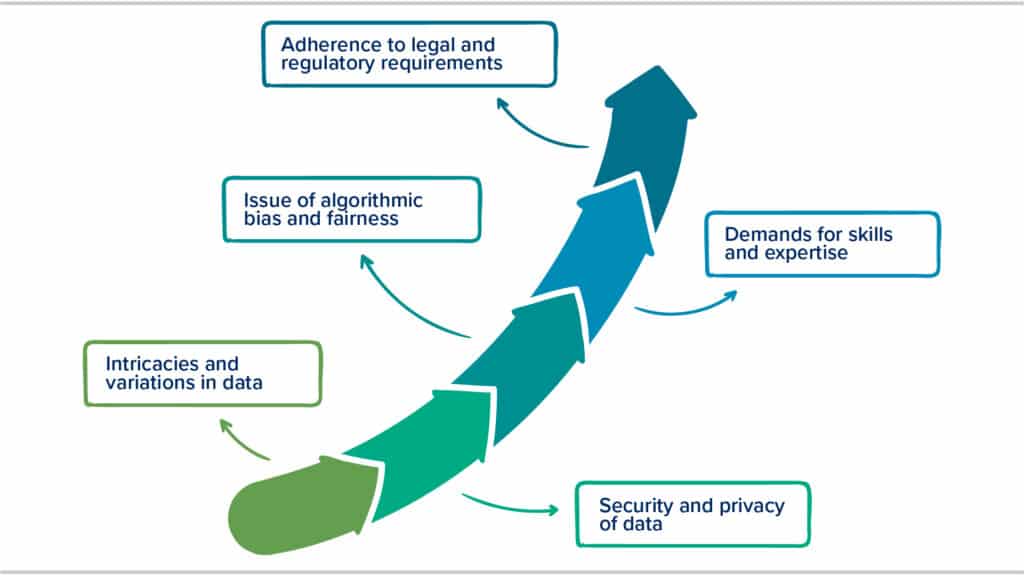
- Intricacies and variations in data: Data engineering encompasses the management of a wide array of data sources, formats, and structures. Gen AI algorithms need to comprehend and adjust to this complexity. However, ensuring the accuracy and dependability of automated processes when dealing with diverse data sources can be challenging. It necessitates meticulous validation and testing to accommodate the nuances of distinct datasets.
- Security and privacy of data: While automation enhances efficiency, it also raises concerns about data security and privacy. With Gen AI automating sensitive data handling tasks, organizations must implement robust security measures to safeguard against unauthorized access, data breaches, and potential misuse. Employing encryption, access controls, and monitoring mechanisms becomes imperative to uphold data privacy and security.
- Issue of algorithmic bias and fairness: Gen AI systems utilize algorithms that learn from historical data, which can lead to unintended bias if the training data is biased or reflects existing inequalities. To maintain fairness and equity in data engineering tasks, it is crucial to thoroughly assess and mitigate algorithmic bias.
- Demands for skills and expertise: Integrating Gen AI for automating data engineering tasks requires a proficient workforce. Organizations must have data engineers with expertise in understanding and effectively leveraging Gen AI technologies. Upskilling and reskilling initiatives are vital to bridge the skills gap and empower data engineering teams to fully harness the potential of Gen AI.
- Adherence to legal and regulatory requirements: With the evolution of Gen AI, legal and regulatory frameworks may necessitate adaptation. Organizations must stay abreast of changing regulations concerning data privacy, security, and algorithmic transparency. Complying with these regulations ensures that Gen AI deployment aligns with legal requirements and mitigates potential risks.

Investigating the contribution of Gen AI to data integration and management
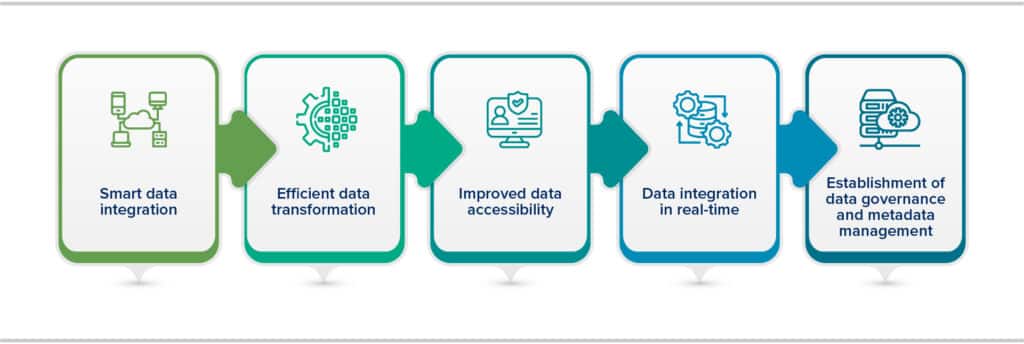
The success of data engineering initiatives in product engineering heavily relies on data integration and management. Gen AI introduces groundbreaking capabilities that have the potential to revolutionize how organizations approach data integration and management processes. Let’s explore the role of Gen AI in these domains and the benefits it brings forth:
- Smart data integration: By employing intelligent algorithms, Gen AI enables effortless data integration from various sources. It automatically identifies data relationships, maps schemas, and harmonizes data formats, enabling organizations to establish a unified data view. This intelligent integration empowers data engineers to access and analyze a comprehensive dataset, leading to deeper insights and more accurate decision-making capabilities.
- Efficient data transformation: Data transformation entails shaping, cleaning, and structuring raw data to meet specific requirements. Gen AI can automate data transformation processes, thereby reducing manual effort and expediting data preparation for analysis. With Gen AI, data engineers can establish rules and algorithms that automatically transform data, ensuring consistency and quality throughout the entire transformation process.
- Improved data accessibility: Gen AI technologies enhance data accessibility by enabling self-service data access and exploration. With user-friendly interfaces and natural language processing capabilities, Gen AI-powered tools enable business users to access and analyze data independently, reducing dependence on data engineers. This democratization of data empowers organizations to cultivate a data-driven culture across diverse teams and departments.
- Data integration in real-time: In the current landscape, real-time data integration is becoming increasingly vital. Gen AI can enable real-time data integration by continuously ingesting and processing data as it arrives, guaranteeing organizations access to the most up-to-date information for decision-making. Real-time data integration, powered by Gen AI, empowers businesses with timely insights and enables them to respond swiftly to emerging trends and shifting market conditions.
- Establishment of data governance and metadata management: Data quality, compliance, and traceability rely on efficient data governance and metadata management. Gen AI can automate data governance processes by automatically capturing and documenting metadata, lineage, and data quality metrics. This streamlines data governance and ensures that data remains well-governed, thoroughly documented, and traceable throughout its lifecycle.
Maintaining data privacy and security in the age of Gen AI
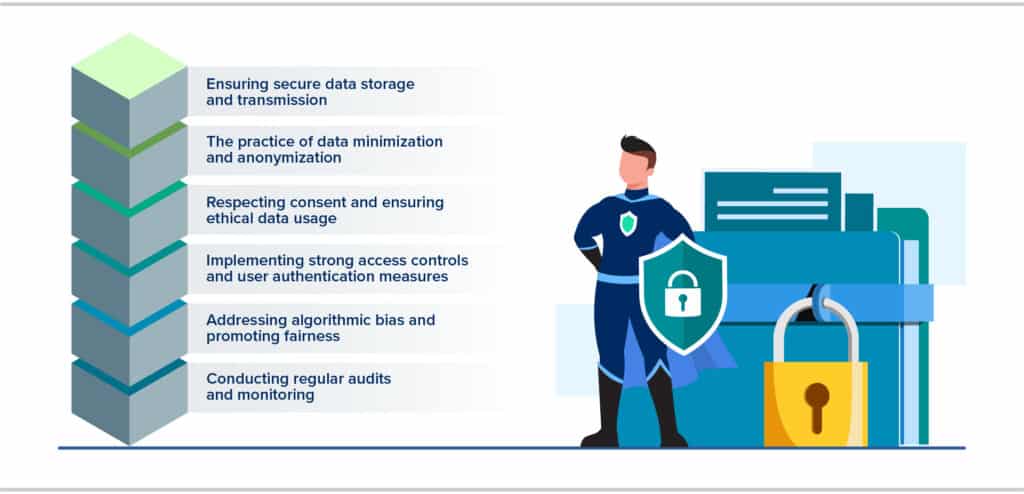
As Gen AI gains prominence in data engineering, safeguarding data privacy and security becomes increasingly crucial. As organizations utilize Gen AI techniques to process and analyze extensive data, implementing robust measures to protect sensitive information is essential. Let’s delve into the key factors for ensuring data privacy and security in the era of Gen AI:
- Ensuring secure data storage and transmission: Data is integral to Gen AI for generating insights, underscoring the importance of secure data storage and transmission. Organizations should utilize encryption techniques to safeguard data at rest and during transmission, minimizing the risk of unauthorized access or data breaches. Implementing secure protocols and maintaining robust access controls will further bolster data security.
- The practice of data minimization and anonymization: In order to mitigate privacy risks, organizations should implement data minimization practices, collecting only the essential data needed for analysis. Leveraging Gen AI techniques can aid in anonymizing personally identifiable information (PII) by eliminating direct identifiers or transforming data to prevent individual identification. By minimizing and anonymizing data, organizations can safeguard individual privacy while still extracting valuable insights.
- Respecting consent and ensuring ethical data usage: As Gen AI processes extensive amounts of data, organizations must prioritize obtaining informed consent from individuals whose data is being processed. This entails transparently communicating the purpose and potential outcomes of data analysis. Respecting ethical guidelines and ensuring compliance with data protection regulations becomes paramount to maintain trust and ensure responsible use of data.
- Implementing strong access controls and user authentication measures: Maintaining control over data access is vital in preventing unauthorized use or manipulation. Organizations should enforce robust access controls to ensure that only authorized personnel can access sensitive data. Additionally, implementing user authentication mechanisms, such as multi-factor authentication, adds an extra layer of security to prevent unauthorized access to data and Gen AI systems.
- Addressing algorithmic bias and promoting fairness: Gen AI systems learn from historical data, which may embed biases or mirror existing societal inequalities. Evaluating and mitigating algorithmic bias in data engineering processes is essential. Regular monitoring, rigorous testing, and ensuring diversity and representativeness in training datasets can help address bias and promote fairness in the outcomes generated by Gen AI systems.
- Conducting regular audits and monitoring: Ongoing auditing and monitoring are essential to identify and address potential security vulnerabilities or breaches. Organizations should establish monitoring mechanisms to track data access, system activity, and data processing activities. Regular audits of data engineering processes and Gen AI algorithms can aid in identifying and rectifying security gaps or compliance issues.
Revealing the new horizons of data engineering
Gen AI opens up vast opportunities for enhancing data engineering in product engineering processes, empowering decision-making, and driving business outcomes. Nevertheless, organizations must navigate the challenges and ethical considerations tied to Gen AI to responsibly maximize its benefits.
As data engineering continues to evolve, embracing Gen AI and addressing its implications will be pivotal in shaping the future of data-driven organizations. By staying informed, adapting to technological advancements, and upholding ethical principles, organizations can unlock the full potential of Gen AI and thrive in the data-driven era.
